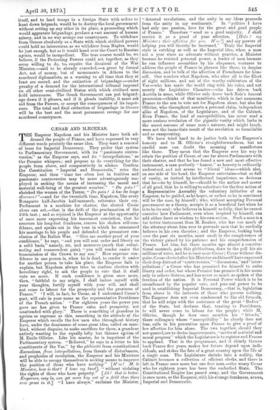TOPICS OF THE DAY.
THE MARATHON MASSACRE.
" PRESIDENT " RIEL, British subject, rebel, and head of the so-called Provisional Government of the Red River, murdered one Mr. Scott, British subject and loyalist, under circumstances which made the atrocity an intentional and most gross insult to the British Government and the British people. Every circumstance was present which could aggravate the crime, or wound the sensitiveness of a proud nation ; the murder was committed by the head of an insur- rectionary government, and as an act of political defiance, and on a man who was not only innocent, but deserving of every commendation and reward ; yet it created no excitement, and very little indignation. A colonist had been shot for loyalty, and who cared either for loyalty or for colonists ? The Houses made no demonstration, the Ministry showed no sign either of horror or of pity, the Times wrote no leaders, the people scarcely read, and did not remember, the telegrams announcing the event. But for a certain agitation in Canada, it seems doubtful if anything would have been done to punish Riel. A few months after, a gang of brigands in a foreign country murder three English gentlemen,—two of them men belonging to great families, and one holding a diplomatic position, men known and liked in good society,—and all Britain starts up in a fever of rage and horror. The Govern- ment not only exerts itself to the utmost to save the victims —we suppose, though we are not quite sure, it would have done that for poor Scott—trampling over international law in its eagerness of pity ; but it is ready to move steamers, to make demands for compensation, almost to go to war, to obtain atonement ; the House of Commons, meeting after the recess, asks first for information on the massacre; the papers, in white fury, are urging the most immediate and extreme measures of retaliation. We do not blame the emotion in the second case ; on the contrary, we welcome it as one more proof that the shallow and feeble "policy " called non-inter- vention is a mere phrase, invented to cover the temporary feebleness of successive English Governments, with no root whatever either in the national intellect or the national instincts. Nobody wants to intervene until there is a cause, and whenever there is a cause visible enough to convince an unimaginative people of its existence, the country shrieks for intervention; and as modern cabinets obey the country, " non- intervention " need not frighten us much. Only it is not creditable to the English people that it should so demand visibleness as its condition of sympathy, that Society should be so moved when its friends mourn and so hard when its brethren suffer, that its sympathy should be so strong and its sense of duty so lamentably weak, that it should be so like a had but " kindly " Sing who neglects all he does not see to foster all immediately around him. Nor is it creditable that when at last justly roused, it should be so inarticulate, should relieve itself so completely by brainless, aimless, mischievous swearing at large. The deaths of Mr. Herbert, Mr. Vyner, Mr. Lloyd, and M. de Boyl were atrocious murders, com- mitted under circumstances which may give the nation the gravest cause of complaint or even of action against the Hellenic Government, but which furnish no excuse whatever —nothing would furnish an excuse—for the womanish burst of angry weeping in which the newspapers have been indulg- ing. If we are to act—and action is, we believe, imperative— let us act like a great nation, not like a parcel of infuriated schoolboys. The case against the Greek Government is a very serious one indeed, though the public has hit upon the wrong grava- men. That Government is wrong, to begin with, in its original position. It is one of the obligations which civilization in return for the protection it secures imposes on every govern- ment, that it should, to the best of its ability, maintain such external order that strangers should be able to move on their affairs in some decent security; that it should, at all events, do its best to preserve them from violent outrage or assassination. So strong is this rule, that in cases where the Government is for any reason unable to perform this function, as in Turkey, Egypt, and China, Western Europe compels the defaulting States to agree to " capitulations," under which its own Envoys exercise the powers needful for the security of foreigners ; and that even in civilized States, the strongest representations are occasionally and lawfully made to secure justice against private injury to the subjects of the remon- strating State. The Greek Government has not only not main-
tained this security, but has not honestly tried to maintain it It has, for purposes not in themselves blameable, winked persistently at the organization of robber bands as a cheap militia to be hereafter employed against Turkey ; and it is notorious, indeed it is mentioned in Mr. Erskine's despatches, that the brigand chiefs have some occult relation with Greek statesmen, that they are, in fact, employed to dis- credit particular ministers, sometimes, it is believed, by men actually connected with the Administration. So well established is this apathy, that if the Protecting Powers upon this ground alone were to demand from Greece a "capitulation," a treaty authorizing the establishment in Athens of an international tribunal for the protection of foreigners, they would be justi- fied by precedent. The Hellenes have no more right to refuse to put down brigands—when foreigners are liable to their attacks—than to refuse to put down wreckers, an offence which of late years has been held to be just cause for com- pulsion, and was in fact the theoretical cause of the forcible "opening " of Japan. Any action on that ground would be justifiable, even if it went the length of a formal notice to the Greek Government that brigandage must cease, or such a tribunal be established under penalty of war. In this par- ticular instance, moreover, the Greek Government, except in one respect, behaved with discreditable want of consideration for men who by the written law of nations, as well as by the custom of Europe, were its guests. It was distinctly in the right in refusing the amnesty demanded, and Lord Clarendon distinctly in the wrong in demanding one. He, of course, was. carried away by a sort of passion of pity for men in his own service ; but his telegram, if addressed to a great Government, must have been followed by an apology for an inter- ference on behalf of civil criminals. Civilization ends if criminals are to obtain from the very magnitude of their crime itself impunity for its commission. ' That such amnesties. had been given before matters nothing, for to refuse them at. last was to return to the right path. But there was no need for the despatch of soldiers before the prisoners had been released, and gross want of judgment in despatching them.. The money was ready and in Athens, the Greek Government. had not only assented to its payment, but had, to save time, authorized such payment from the National Bank. Two or- three days' grace could have been of no advantage to the brigands, who could have been intercepted in any flight towards Thessaly by troops despatched in steamers, and the march of the soldiers might as well have commenced after the rescue as before it. The duty of the State, which is to hunt. down brigands, not to amnesty them, would have been equally performed ; and its dignity, a dignity of which in Greece it thinks only by fits and starts, would have been equally well maintained. Moreover, its faith would have been preserved.. Mr. Erskine, the British Minister, aware that this was the true point of danger, made this his special request to the Minister of War, and received his pledge, that of the Bing, and that of the President of the Council, that no soldiery should start before the captives had arrived. This pledge, one perfectly in accord with ordinary police proceedings in every country,—as, for example, whenever spies are employed against coiners,—was wilfully broken, and we greatly fear the reason for breaking it was the apprehension that as diplo- matists had been seized the Greek Treasury might be held responsible for repayment of the ransom. Had the soldiers not been sent prematurely, no one would have been murdered. The brigands would not have destroyed their own trade by making all future ransoms useless, nor would their ruffianly bloodthirstiness have been excited by the difficulty of carrying their prisoners in their rapid flight. The lives of the unhappy Englishmen were no objects of theirs, as they showed by send- ing home the ladies and the little girl. There was reckless- ness in such bad faith, recklessness which deserves any extent of popular or official denunciation, and should produce, if the Greek Government is honestly grieved at the calamity, the immediate dismissal of the Minister at War.
There remains the reparation to be exacted, and upon this point the public in its rage and grief—rage and grief which are perfectly justifiable, though they ought also to be displayed when humbler persons, like Scott, are assassinated—is evi- dently bewildered. There is cause enough in the massacre, if the Government is believed guilty of any complicity with the brigands, for war, even if it ended in conquest ; in fact, for the forcible reorganization of Greece. But if the Government is acquitted, merely to land troops to avenge a particular wrong in spite of Government would be most unjustifiable. A State like Britain is bound to think of the world as well as
itself, and to land troops in a foreign State with orders to hunt down brigands, would be to destroy the local government without setting up any other in its place, a proceeding which would aggravate brigandage, produce a vast amount of human misery, and in no way avenge our countrymen. To withdraw from Greece absolutely as a State with which civilized powers could hold no intercourse, as we withdrew from Naples, would be just enough, but as it would hand over the Court to Russian agents, would be inexpedient. The true course would be, we believe, if the Protecting Powers could act together, as they seem willing to do, to. require the dismissal of the War Minister,—said to be already conceded,—a grant by formal Act, not of money, but of monuments in Athens to the murdered diplomatists, as a warning to all time that they at least are sacred, and the extinction of brigandage.—under penalty of a demand for the international tribunal imposed on all other semi-civilized States with which civilized men hold intercourse. The Greek Government can put brigand- age down if it pleases, and if it pleads inability, it must ask aid from the Powers, or accept the consequences of its impot- ence. The total and final extinction of brigandage in Greece will be the best and the most permanent revenge for our murdered countrymen.



































 Previous page
Previous page